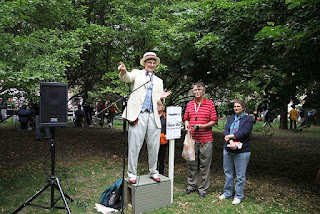Several times in this blog o' mine I've noted the confusion which often surrounds pronouncements and platitudes regarding what we enjoy calling free speech. Here in our Glorious Union, it's claimed that our right to free speech is grounded in the First Amendment to the Constitution, which states that Congress shall make no law abridging the freedom of speech. Strictly speaking, of course, no right is created thereby; it's a prohibition. It doesn't say everyone has a right to free speech. It says only that Congress may not adopt laws of a particular kind.
Although many feel that the First Amendment provides that nobody may restrict our freedom of speech, it very clearly refers only to Congress. Via the Fourteenth Amendment and case law, it's been extended to apply to actions by state and local as well as the federal government, but it doesn't relate to the actions of any person or entity which isn't a representative or agency of a government.
One can if one wishes claim there's a natural or God-given right to free speech, but it's difficult to rely on such a claim to prevent someone from restricting our speech. If we wait for nature or God to punish those who make us shut up or prevent them from doing so, it's more than likely that we'll be unable to speak when that happens, if that happens.
There's a kind of romance associated with free speech. The picture associated with this post is of someone speaking at Bughouse Square in Chicago, across from the Newberry Library, where I labored as a student for a time (studying J.S. Mill and the Philosophical Radicals, interestingly enough). The speaker is speaking from atop a box, possibly a soapbox as would be traditional. The purpose of the box is to make the speaker visible above the crowd which (it's hoped) would be listening intently to what's being said. This is an image which is conjured up from time to time in reverence to free speech--the common, or perhaps uncommon, person delivering views in public.
It's an attractive image, as is the idea of free speech itself. Everyone should be able to speak their mind without fear of reprisal. But in these sad times the tendency is more and more to claim that that everyone should be able to speak their mind no matter what they say and without objection or limitation. Reprisal isn't required to violate free speech, according to some of those who self-interestedly champion free speech these days. Vocal or active disagreement may violate the right to free speech, or a boycott may do so, even when by private persons. Even shaming may do that, or not being allowed to say something in a particular (private) place or on privately owned media.
This is called censorship, and when it is called that those who make the claim also do so as a result of their confusion, or ignorance regarding the meaning of the word. A censor is a government official. Censorship is an official action, not a private one.
Even the First Amendment and the legal right it creates (to the extent there is a "right") is limited. The government is not prohibited from restricting speech in certain circumstances. Since the First Amendment doesn't apply to private conduct, it makes sense that a private person or entity would be able to restrict speech to a much greater extent than the government particularly where the speech is taking place in property the private person owns.
This shouldn't be surprising. It should be even less surprising that certain speech is unworthy of protection beyond legal protection, and that no "right" to that speech exists. People have no more right to indulge in malicious, stupid, ignorant, bigoted or hateful speech than they have a right to be malicious, stupid, ignorant, bigoted or hateful people. Other people are perfectly free to object to such speech or people and act against them, within the law.
Free speech doesn't entail that all speech is equally worthy, or that there is no basis on which speech of any kind can be objectionable. Free speech doesn't require that we suspend judgment when we encounter speech that is despicable and accept any view voiced regardless of its merit. We need not tolerate all speech, just as we need not tolerate all conduct on the grounds that all people are free to do as they please. The legal right of free speech and the First Amendment are poorly served by those who claim the right to say whatever they want whenever or wherever they want.

%20-%20Copy.jpg)
.jpg)